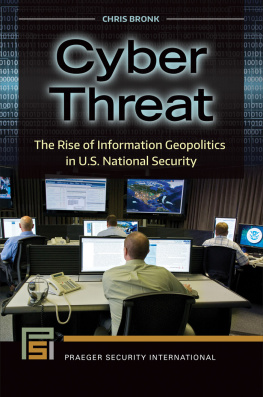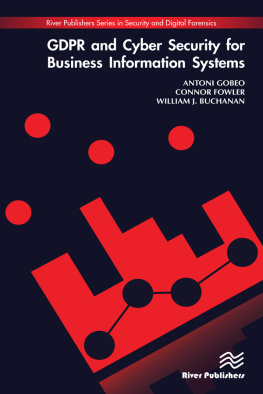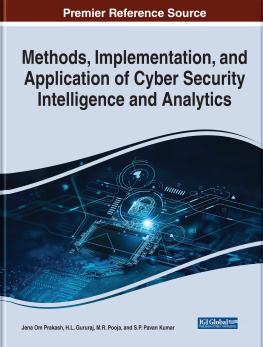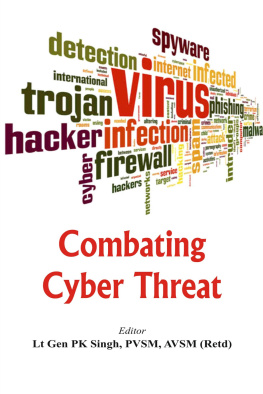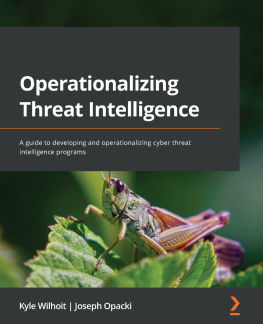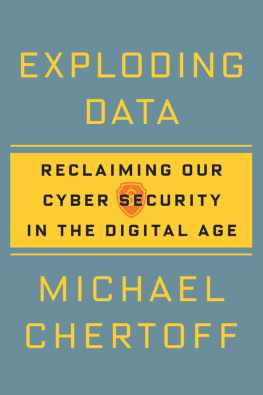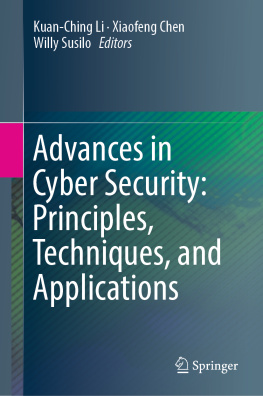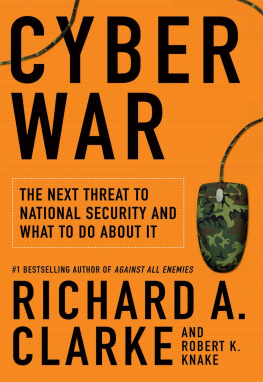Chris Bronk - Cyber Threat: The Rise of Information Geopolitics in U.S. National Security
Here you can read online Chris Bronk - Cyber Threat: The Rise of Information Geopolitics in U.S. National Security full text of the book (entire story) in english for free. Download pdf and epub, get meaning, cover and reviews about this ebook. year: 2015, publisher: ABC-CLIO, genre: Politics. Description of the work, (preface) as well as reviews are available. Best literature library LitArk.com created for fans of good reading and offers a wide selection of genres:
Romance novel
Science fiction
Adventure
Detective
Science
History
Home and family
Prose
Art
Politics
Computer
Non-fiction
Religion
Business
Children
Humor
Choose a favorite category and find really read worthwhile books. Enjoy immersion in the world of imagination, feel the emotions of the characters or learn something new for yourself, make an fascinating discovery.
- Book:Cyber Threat: The Rise of Information Geopolitics in U.S. National Security
- Author:
- Publisher:ABC-CLIO
- Genre:
- Year:2015
- Rating:5 / 5
- Favourites:Add to favourites
- Your mark:
- 100
- 1
- 2
- 3
- 4
- 5
Cyber Threat: The Rise of Information Geopolitics in U.S. National Security: summary, description and annotation
We offer to read an annotation, description, summary or preface (depends on what the author of the book "Cyber Threat: The Rise of Information Geopolitics in U.S. National Security" wrote himself). If you haven't found the necessary information about the book — write in the comments, we will try to find it.
Chris Bronk: author's other books
Who wrote Cyber Threat: The Rise of Information Geopolitics in U.S. National Security? Find out the surname, the name of the author of the book and a list of all author's works by series.
Cyber Threat: The Rise of Information Geopolitics in U.S. National Security — read online for free the complete book (whole text) full work
Below is the text of the book, divided by pages. System saving the place of the last page read, allows you to conveniently read the book "Cyber Threat: The Rise of Information Geopolitics in U.S. National Security" online for free, without having to search again every time where you left off. Put a bookmark, and you can go to the page where you finished reading at any time.
Font size:
Interval:
Bookmark:

Cyber Threat
The Rise of Information Geopolitics in U.S. National Security
CHRIS BRONK
Praeger Security International

Copyright 2016 by Chris Bronk
All rights reserved. No part of this publication may be reproduced, stored in a retrieval system, or transmitted, in any form or by any means, electronic, mechanical, photocopying, recording, or otherwise, except for the inclusion of brief quotations in a review, without prior permission in writing from the publisher.
Library of Congress Cataloging-in-Publication Data
Names: Bronk, Chris, author.
Title: Cyber threat : the rise of information geopolitics in U.S. national security / Chris Bronk.
Description: Santa Barbara, California : Praeger, [2016] | Includes bibliographical references and index.
Identifiers: LCCN 2015034347 | ISBN 9781440834981 (hardcopy : alk. paper) | ISBN 9781440834998 (ebook)
Subjects: LCSH: Internet governanceUnited States. | CyberspacePolitical aspects United States. | Computer securityPolitical aspectsUnited States. | Internet in espionageUnited States. | CyberterrorismUnited States. | National security United States. | Geopolitics.
Classification: LCC TK5105.8854 .B76 2016 | DDC 355/.03302854678dc23 LC record available at http://lccn.loc.gov/2015034347
ISBN: 9781440834981
EISBN: 9781440834998
20 19 18 17 161 2 3 4 5
This book is also available on the World Wide Web as an eBook.
Visit www.abc-clio.com for details.
Praeger
An Imprint of ABC-CLIO, LLC
ABC-CLIO, LLC
130 Cremona Drive, P.O. Box 1911
Santa Barbara, California 93116-1911
This book is printed on acid-free paper 
Manufactured in the United States of America
Sometimes it really is about being in the right place at the right time. For me, that moment was at the annual convention of the International Studies Association in 2010. In a cramped New Orleans hospitality suite, in which heaven knows how many possibly shady deals were concluded, I chaired a panel of international relations grad students who all were basically asking, Is it ok for us to study this cyberspace thing? In the ridiculously crowded room was Lene Hansen, who asked me later to attend a workshop, postponed once by Eyjafjallajkulls eruption, held at Central European University in Budapest. At that gathering, I realized the answer to my panelists question was an emphatic yes. Also in the room was Aaron Brantly, then a grad student, now a brilliant researcher at the Army Cyber Institute, who followed his intuition to finish his cybersecurity policy doctorate.
This book is the account of a spectator who observed the arrival of geopolitics to cyberspace. It spans three careers, at the State Department, Rice Universitys Baker Institute, and the University of Houstons College of Technology, where I currently spend much time preparing new entrants into the cybersecurity workforce. At this point, educating as many high-quality professionals in the field may be our best bet for securing cyberspace.
In January 2000, I began writing a doctoral thesis on the international politics of cybersecurity. Although one of my professors said I was probably nuts to take on the topic, my advisor, Stuart Thorson, felt that such foolhardy endeavors were worth pursuing. I can thank Stu as well for nominating my thesis for the award it received and then-dean Mitchel Wallerstein for conferring it. At Syracuse, my professors, David Berteau, Matt Bonham, Shiu-Kai Chin, Vernon Dale Jones, Harry Lambright, Susan Wadley, Melvyn Levitsky, and Milton Mueller, enriched me enormously on the topics of bureaucracy, diplomacy, computer security, Internet engineering, and of course, international politics. I wish I could have stuck around longer.
When the Foreign Service called in 2001, I went, and got the chance to continue my research while learning the business of security through on-the-job training. I had some great colleagues and bosses shape my thinking, including Alfred Anzaldua, Michael Bishton, Richard Boly, Bruce Burton, Greg Garland, John Janek, Eric Johnson, Dan Sheerin, Buck Shinkman, Tiffany Smith, Wilson Dizard, and David Stewart. Gerry Gallucci talked me into joining the staff of the Office of eDiplomacy by suggesting that I eschew taking a job in which I would learn how paper moved through the building for one that would show me how the bits flowed through it. Tom Niblock did me the great service of going to bat for me so that I could speak at Wikipedias convention at Harvard in 2006, when the State bureaucracy thought it unnecessary. Incredibly supportive as well has been Alec Ross, who always finds time to lend an ear despite his ridiculous schedule.
In my job interview for the fellow in information technology, society, and policy at Rice University, I was thoroughly grilled by Moshe Vardi. Over the decade since, Moshe has never allowed me to take the easy way out or engage in insufficiently critical thinking. My Baker Institute boss, Ambassador Edward Djerejian, gave me the platform to think and write about cyberspace, I think because he was genuinely fascinated by the global transformation produced by the Internet and computing or possibly to keep tabs on Mrs. Djerejians interest in online commerce. Also at Rice came the day Secretary James A. Baker III asked me to come in and talk about hacking was another strong indicator that this cyber business mattered.
Many others at Rice pushed me to think bigger and do more. Jan Odegard always was able to make ideas happen and Christine Kimmel could figure out how to fund them. Among the faculty and staff I can thank for their time and dedication are: Joe Barnes, Tony Elam, Ric Stoll, Devika Subramanian, Ken Medlock, Steven Lewis, Neal Lane, Allen Matusow, Bill Arnold, Matthew Wettergreen, Liane Hart, Amy Kavalewitz (the other red Swingline person), Sidney Burrus, and Bob Brito. I had some amazing student interns and Ph.D. students as well, including Andi Bandyopadhyay, Anhei Shui, Judson Dressler, Theodore Book, Adam Pridgen, Sofia Haase, Max Ingraham-Rakatansky, Rima Tanash, Sean Graham, and Holt Weeks.
The cybersecurity academic cohort in Houston is rather small, but I am lucky to work with both Wm. Arthur Conklin and Dan Wallach. They are wonderful collaborators. My conversations with Art were critical in establishing the bounds of this book, and included lengthy deliberations on the ethics of security. Dans ideas for getting to the bits on things like Chinese Internet censorship (or Turkish censorship) continue to amaze me.
At the University of Houston, I interact with wonderful colleagues including Deniz Gurkan, Stephen Huang, Jaspal Subhlok, Greg Vetter, Hesam Panahi, Paula deWitte, and Emily Berman. I owe enormous gratitude to my department chair, Ray Cline, and to my incredibly supportive dean, William Fitzgibbon. Thanks also go to those who have supported my research, including Victor Piotrowski, Hriar Cabayan, Adnan Amjad, Alice Aanstoos, and Llayron Clarkson as well as Amy Jones, the ber-administrator who holds the UH Center for Information Security Research and Education together on a day-to-day basis. My UH graduate assistants, Vishal Gulati and Anthony Moyegun, were both enormously helpful in this project.
I am also fortunate to be part of a fascinating group of researchers and practitioners spread around the globe who think about not just cybersecurity, but how it fits into global politics. It was pure joy writing the
Font size:
Interval:
Bookmark:
Similar books «Cyber Threat: The Rise of Information Geopolitics in U.S. National Security»
Look at similar books to Cyber Threat: The Rise of Information Geopolitics in U.S. National Security. We have selected literature similar in name and meaning in the hope of providing readers with more options to find new, interesting, not yet read works.
Discussion, reviews of the book Cyber Threat: The Rise of Information Geopolitics in U.S. National Security and just readers' own opinions. Leave your comments, write what you think about the work, its meaning or the main characters. Specify what exactly you liked and what you didn't like, and why you think so.

